Econometric Tools for Macroeconomic Forecasting and Simulation
The aim of the research group “Econometric Tools for Macroeconomic Forecasting and Simulation” is to enhance research on, and development, implementation, evaluation, and application of quantitative macroeconometric models for forecasting and analysing aggregate economic fluctuations and developments.
Besides forecasting macroeconomic dynamics, long-term growth processes and the interaction of economic activity and natural environment play a major role in simulation models that are mainly implemented for policy impact assessment. Research in this group contributes to the econometric foundation and the methodological improvements of the IWH forecasts and macroeconomic policy recommendations.
Furthermore, this group conducts comprehensive empirical analysis and develops econometric tools that are used for third-party funded projects. In recent years, models have been developed for Volkswagen Bank, for several economic ministries in central Asia with financial support by GIZ, for the German Environment Agency (UBA) and within the Horizon 2020 project ENTRANCES.
Workpackage 1: Nowcasting and Short-term Forecasting with Real-time Data
Workpackage 2: Simulation with GE Models and Integrated Assessment Models
IWH Data Project: IWH-Real-time Database and IWH Forecast Database
An important challenge is that macroeconomic data are substantially revised and that the data are published with a considerable time lag. We maintain a large database for major economic aggregates in euro area countries. Although Eurostat publishes national accounts data for all member countries no official real-time data exists and, hence, it is not possible to evaluate forecasts with real-time releases.
The database is complemented by other macro-economic variables that are revised or rebased over time. This unique database will summarise the official data in an efficient and easily accessible way. Furthermore, the database will be supplemented by a forecast database for euro area member states by the European Commission for national account aggregates and forecast assumptions.
The new web application IWH Forecasting Dashboard (ForDas) provides a platform for macroeconomic forecasts from various institutions for the German economy. Users of the Dashboard can assess historical and recent forecasts and to evaluate the forecast performance. Furthermore, it allows for direct comparison across forecast institutions.
Research Cluster
Economic Dynamics and StabilityYour contact

- Department Macroeconomics
EXTERNAL FUNDING
07.2022 ‐ 12.2026
Evaluation of the InvKG and the federal STARK programme
German Federal Ministry for Economic Affairs and Climate Action
On behalf of the Federal Ministry of Economics and Climate Protection, the IWH and the RWI are evaluating the use of the approximately 40 billion euros the federal government is providing to support the coal phase-out regions..
12.2024 ‐ 02.2026
Macroeconomic Modelling for Energy Investments in Vietnam
Deutsche Gesellschaft für Internationale Zusammenarbeit (GIZ) GmbH
08.2024 ‐ 03.2025
Strengthening Public Financial Management in Vietnam
Deutsche Gesellschaft für Internationale Zusammenarbeit (GIZ) GmbH
01.2023 ‐ 12.2023
Early determination of stable results for gross domestic product or real economic growth and gross value added at federal state level
Landesbetrieb Information und Technik Nordrhein-Westfalen
The project examines whether the accuracy of the first estimate of gross value added and gross domestic product for the federal states can be increased, thereby reducing the extent of subsequent revisions.
01.2018 ‐ 12.2023
EuropeAid (EU Framework Contract)
Europäische Kommission
05.2020 ‐ 09.2023
ENTRANCES: Energy Transitions from Coal and Carbon: Effects on Societies
Europäische Kommission
ENTRANCES aims at examining the effects of the coal phase-out in Europe. How does the phase-out transform society – and what can politics do about it?
This project has received funding from the European Union’s Horizon 2020 research and innovation programme under grant agreement No 883947.
10.2019 ‐ 01.2023
Climate Resilient Economic Development
Climate change has a substantial impact on economic growth and a country’s development. This increases the need for reliable and viable approaches to assessing the impact of climate risks and potential adaptation scenarios. Political decision-makers in ministries of planning and economy need sound forecasts in order to design and finance adequate economic policy instruments and actively to take countermeasures. In the pilot countries (Georgia, Kazakhstan and Vietnam), climate risk is included in macroeconomic modelling, enabling the results to be integrated into the policy process so as to facilitate adapted economic planning. The IWH team is responsible for macroeconomic modelling in Vietnam.
07.2016 ‐ 12.2018
Climate Protection and Coal Phaseout: Political Strategies and Measures up to 2030 and beyond
01.2017 ‐ 12.2017
Support to Sustainable Economic Development in Selected Regions of Uzbekistan
01.2017 ‐ 12.2017
Short-term Macroeconomic Forecasting Model in Ministry of Economic Development and Trade of Ukraine
01.2016 ‐ 12.2017
Development of analytical tools based on Input-Output table
The aim of the project was the development of an analytical tool to assess the gains and losses of possible state programs supporting the development of the private sector of the Tajik economy.
11.2015 ‐ 12.2016
Employment and Development in the Republic of Uzbekistan
Support to sustainable economic development in selected regions of Uzbekistan
05.2016 ‐ 05.2016
Framework and Finance for Private Sector Development in Tajikistan
02.2016 ‐ 04.2016
Macroeconomic Reforms and Green Growth - Assessment of economic modelling capacity in Vietnam
10.2015 ‐ 03.2016
Improved Evidence-based Policy Making - GIZ Tadschikistan
Deutsche Gesellschaft für Internationale Zusammenarbeit (GIZ) GmbH
Refereed Publications
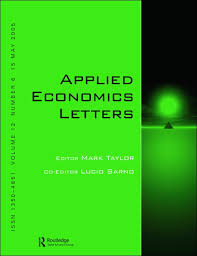
Impulse Response Analysis in a Misspecified DSGE Model: A Comparison of Full and Limited Information Techniques
in: Applied Economics Letters, No. 3, 2016
Abstract
In this article, we examine the effect of estimation biases – introduced by model misspecification – on the impulse responses analysis for dynamic stochastic general equilibrium (DSGE) models. Thereby, we use full and limited information estimators to estimate a misspecified DSGE model and calculate impulse response functions (IRFs) based on the estimated structural parameters. It turns out that IRFs based on full information techniques can be unreliable under misspecification.

Effects of Incorrect Specification on the Finite Sample Properties of Full and Limited Information Estimators in DSGE Models
in: Journal of Macroeconomics, June 2016
Abstract
In this paper we analyze the small sample properties of full information and limited information estimators in a potentially misspecified DSGE model. Therefore, we conduct a simulation study based on a standard New Keynesian model including price and wage rigidities. We then study the effects of omitted variable problems on the structural parameter estimates of the model. We find that FIML performs superior when the model is correctly specified. In cases where some of the model characteristics are omitted, the performance of FIML is highly unreliable, whereas GMM estimates remain approximately unbiased and significance tests are mostly reliable.

Testing for Structural Breaks at Unknown Time: A Steeplechase
in: Computational Economics, No. 1, 2013
Abstract
This paper analyzes the role of common data problems when identifying structural breaks in small samples. Most notably, we survey small sample properties of the most commonly applied endogenous break tests developed by Brown et al. (J R Stat Soc B 37:149–163, 1975) and Zeileis (Stat Pap 45(1):123–131, 2004), Nyblom (J Am Stat Assoc 84(405):223–230, 1989) and Hansen (J Policy Model 14(4):517–533, 1992), and Andrews et al. (J Econ 70(1):9–38, 1996). Power and size properties are derived using Monte Carlo simulations. We find that the Nyblom test is on par with the commonly used F type tests in a small sample in terms of power. While the Nyblom test’s power decreases if the structural break occurs close to the margin of the sample, it proves far more robust to nonnormal distributions of the error term that are found to matter strongly in small samples although being irrelevant asymptotically for all tests that are analyzed in this paper.

Fiscal Spending Multiplier Calculations Based on Input-Output Tables? An Application to EU Member States
in: Intervention. European Journal of Economics and Economic Policies, No. 1, 2012
Abstract
Fiscal spending multiplier calculations have attracted considerable attention in the aftermath of the global financial crisis. Much of the current literature is based on VAR estimation methods and DSGE models. In line with the Keynesian literature we argue that many of these models probably underestimate the fiscal spending multiplier in recessions. The income-expenditure model of the fiscal spending multiplier can be seen as a good approximation under these circumstances. In its conventional form this model suffers from an underestimation of the multiplier due to an overestimation of the import intake of domestic absorption. In this article we apply input-output calculus to solve this problem. Multipliers thus derived are comparably high, ranging between 1.4 and 1.8 for many member states of the European Union. GDP drops due to budget consolidation might therefore be substantial in times of crisis.

The Halle Economic Projection Model
in: Economic Modelling, No. 4, 2012
Abstract
In this paper we develop an open economy model explaining the joint determination of output, inflation, interest rates, unemployment and the exchange rate in a multi-country framework. Our model -- the Halle Economic Projection Model (HEPM) -- is closely related to studies published by Carabenciov et al. Our main contribution is that we model the Euro area countries separately. In doing so, we consider Germany, France, and Italy which represent together about 70 percent of Euro area GDP. The model combines core equations of the New-Keynesian standard DSGE model with empirically useful ad-hoc equations. We estimate this model using Bayesian techniques and evaluate the forecasting properties. Additionally, we provide an impulse response analysis and a historical shock decomposition.
Working Papers
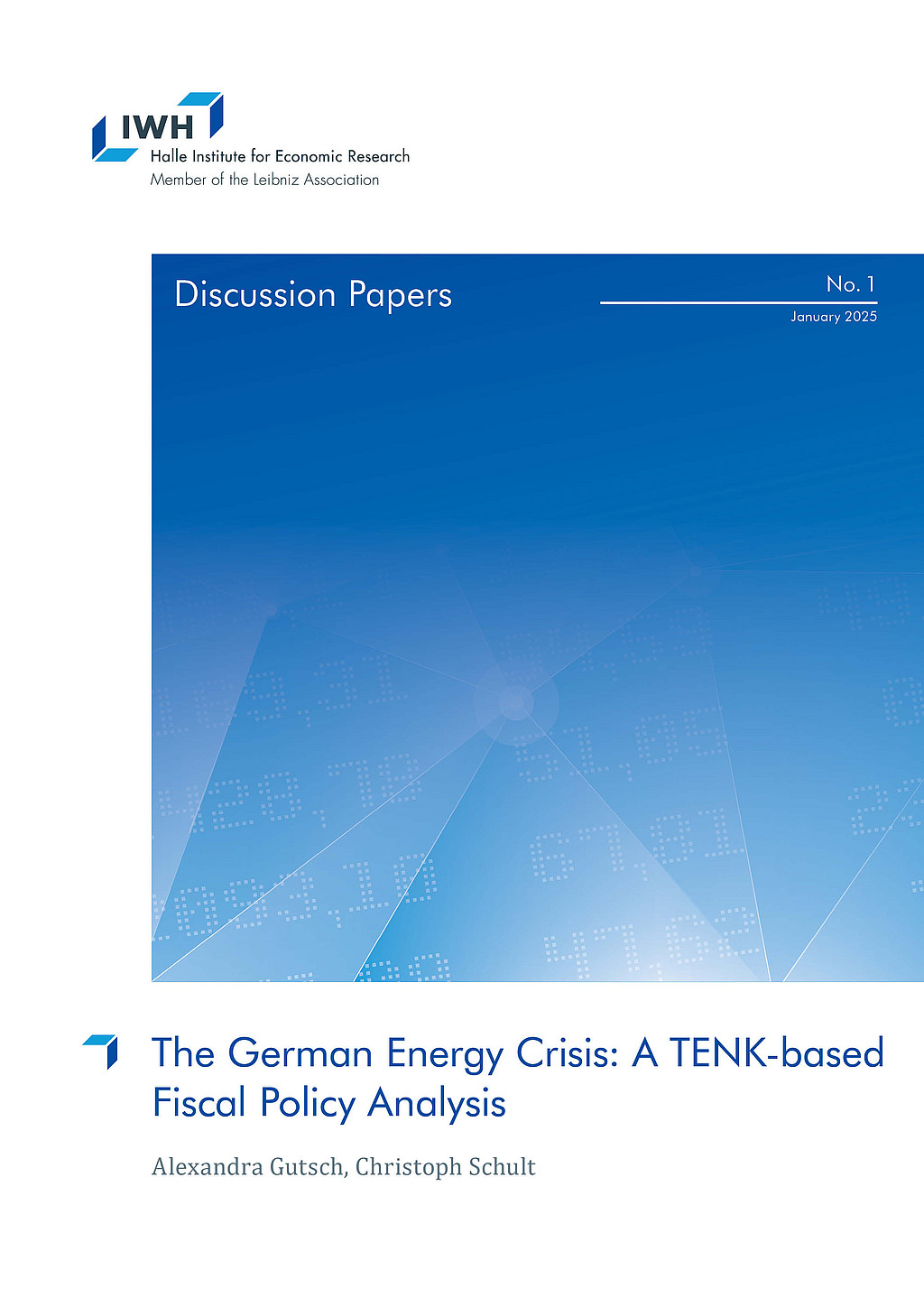
The German Energy Crisis: A TENK-based Fiscal Policy Analysis
in: IWH Discussion Papers, No. 1, 2025
Abstract
<p>We study the aggregate, distributional, and welfare effects of fiscal policy responses to Germany’s energy crisis using a novel Ten-Agents New-Keynesian (TENK) model. The energy crisis, compounded by the COVID-19 pandemic, led to sharp increases in energy prices, inflation, and significant consumption disparities across households. Our model, calibrated to Germany’s income and consumption distribution, evaluates key policy interventions, including untargeted and targeted transfers, a value-added tax cut, energy tax reductions, and an energy cost brake. We find that untargeted transfers had the largest short-term aggregate impact, while targeted transfers were most cost-effective in supporting lower-income households. Other instruments, as the prominent energy cost brake, yielded comparably limited welfare gains. These results highlight the importance of targeted fiscal measures in addressing distributional effects and stabilizing consumption during economic crises.</p>
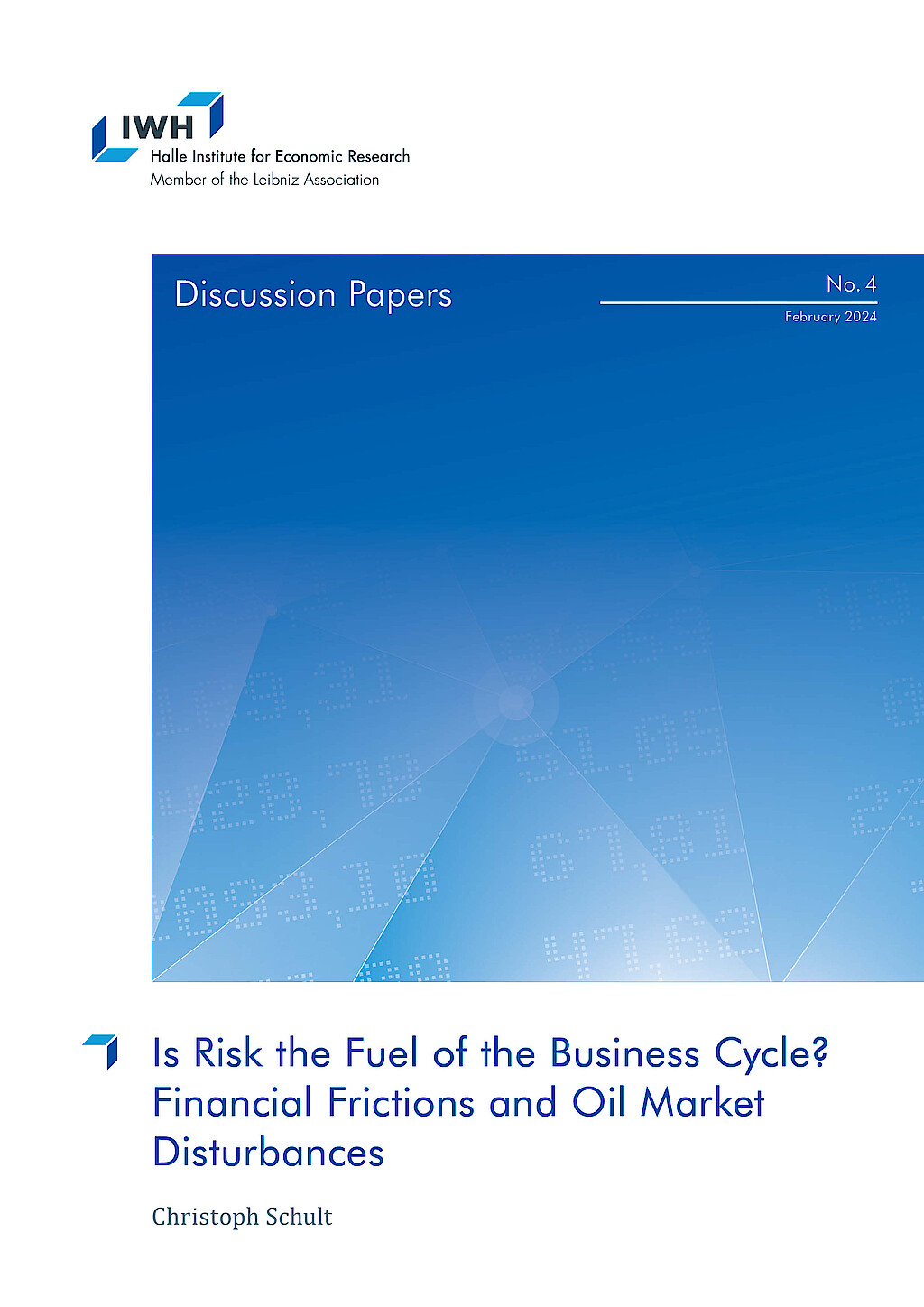
Is Risk the Fuel of the Business Cycle? Financial Frictions and Oil Market Disturbances
in: IWH Discussion Papers, No. 4, 2024
Abstract
I estimate a dynamic stochastic general equilibrium (DSGE) model for the United States that incorporates oil market shocks and risk shocks working through credit market frictions. The findings of this analysis indicate that risk shocks play a crucial role during the Great Recession and the Dot-Com bubble but not during other economic downturns. Credit market frictions do not amplify persistent oil market shocks. This result holds as long as entry and exit rates of entrepreneurs are independent of the business cycle.
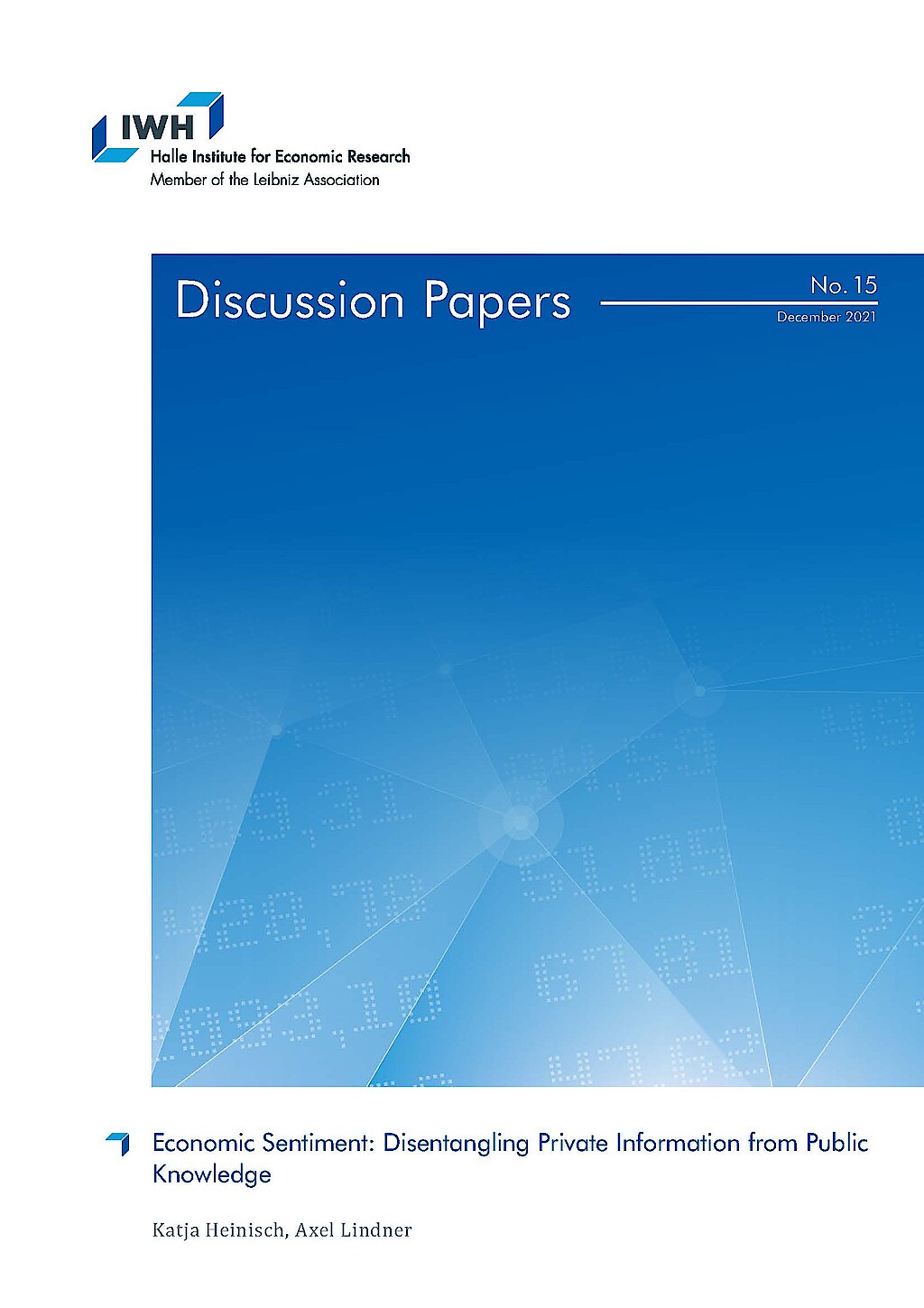
Economic Sentiment: Disentangling Private Information from Public Knowledge
in: IWH Discussion Papers, No. 15, 2021
Abstract
This paper addresses a general problem with the use of surveys as source of information about the state of an economy: Answers to surveys are highly dependent on information that is publicly available, while only additional information that is not already publicly known has the potential to improve a professional forecast. We propose a simple procedure to disentangle the private information of agents from knowledge that is already publicly known for surveys that ask for general as well as for private prospects. Our results reveal the potential of our proposed technique for the usage of European Commissions‘ consumer surveys for economic forecasting for Germany.
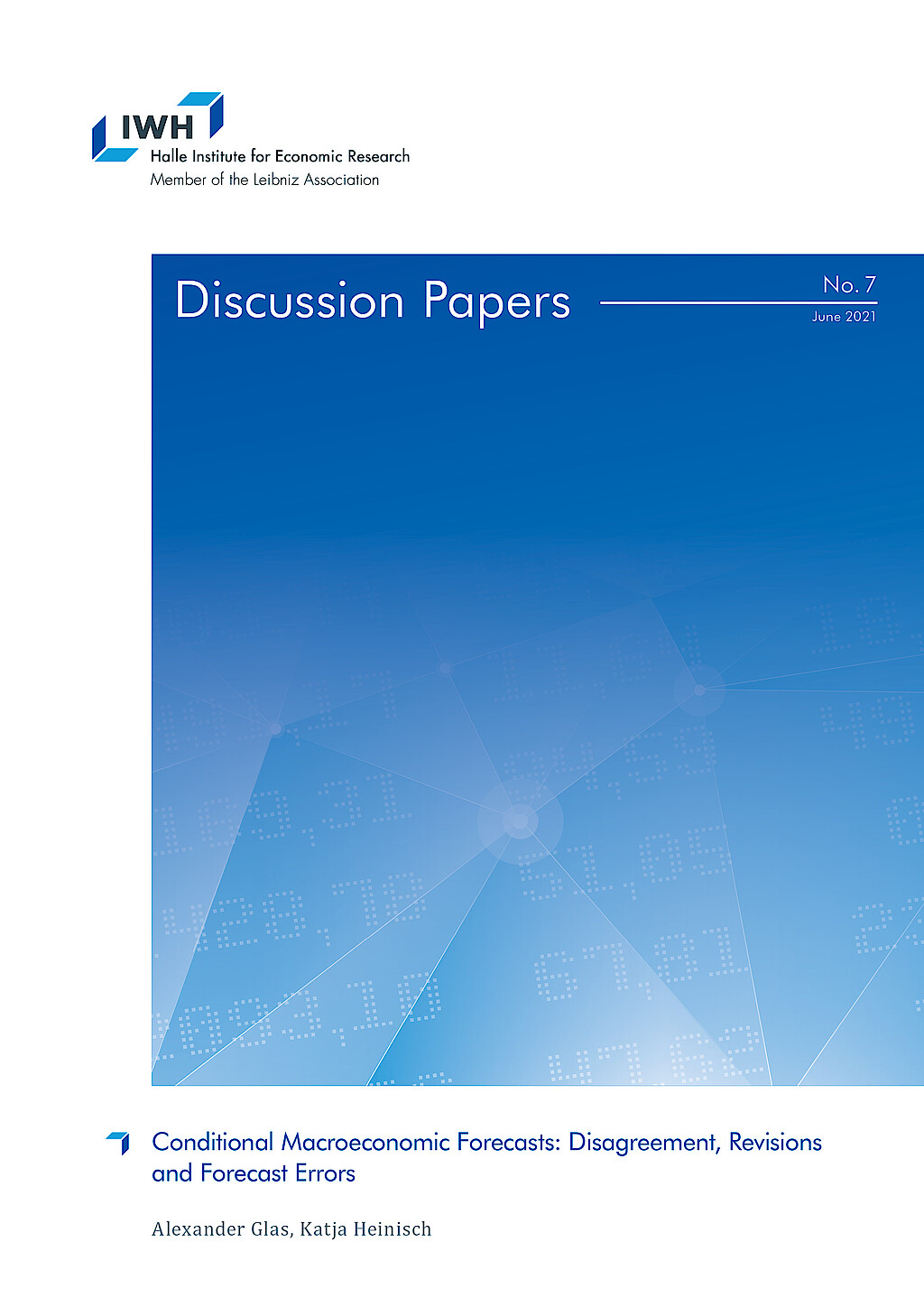
Conditional Macroeconomic Forecasts: Disagreement, Revisions and Forecast Errors
in: IWH Discussion Papers, No. 7, 2021
Abstract
Using data from the European Central Bank‘s Survey of Professional Forecasters, we analyse the role of ex-ante conditioning variables for macroeconomic forecasts. In particular, we test to which extent the heterogeneity, updating and ex-post performance of predictions for inflation, real GDP growth and the unemployment rate are related to assumptions about future oil prices, exchange rates, interest rates and wage growth. Our findings indicate that inflation forecasts are closely associated with oil price expectations, whereas expected interest rates are used primarily to predict output growth and unemployment. Expectations about exchange rates and wage growth also matter for macroeconomic forecasts, albeit less so than oil prices and interest rates. We show that survey participants can considerably improve forecast accuracy for macroeconomic outcomes by reducing prediction errors for external conditions. Our results contribute to a better understanding of the expectation formation process of experts.
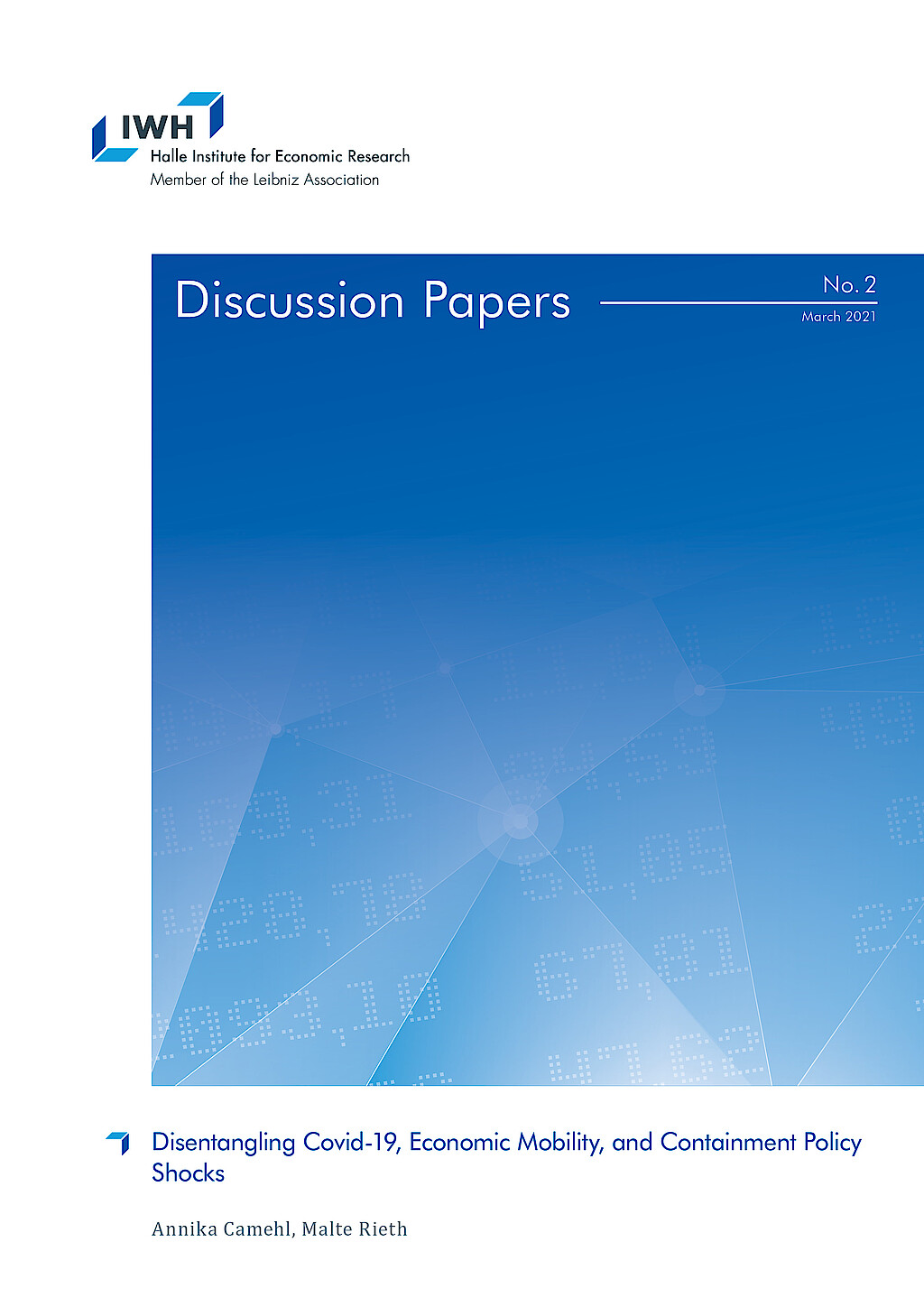
Disentangling Covid-19, Economic Mobility, and Containment Policy Shocks
in: IWH Discussion Papers, No. 2, 2021
Abstract
We study the dynamic impact of Covid-19, economic mobility, and containment policy shocks. We use Bayesian panel structural vector autoregressions with daily data for 44 countries, identified through sign and zero restrictions. Incidence and mobility shocks raise cases and deaths significantly for two months. Restrictive policy shocks lower mobility immediately, cases after one week, and deaths after three weeks. Non-pharmaceutical interventions explain half of the variation in mobility, cases, and deaths worldwide. These flattened the pandemic curve, while deepening the global mobility recession. The policy tradeoff is 1 p.p. less mobility per day for 9% fewer deaths after two months.


























